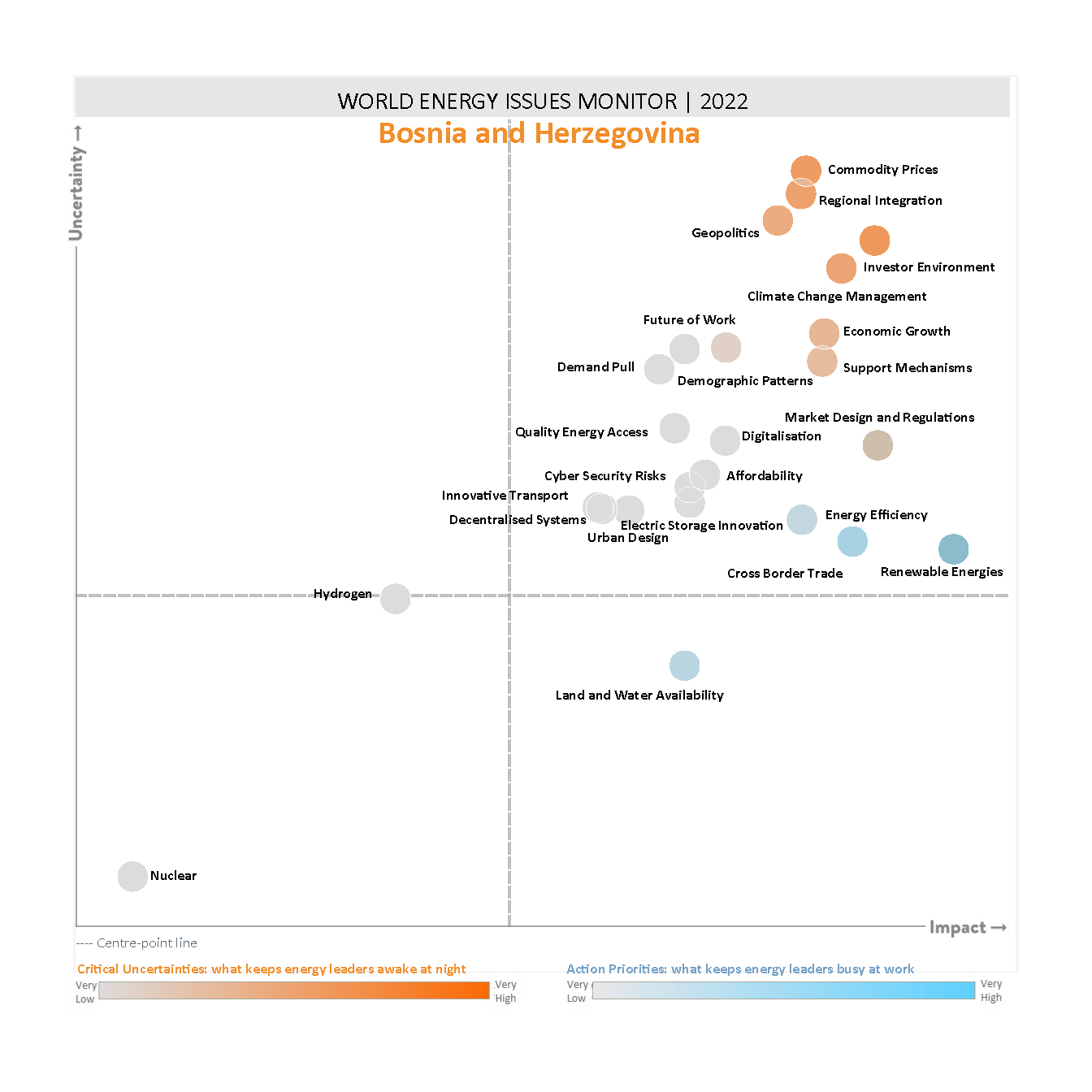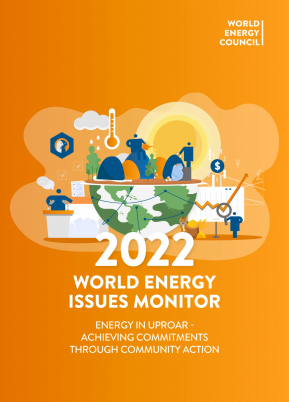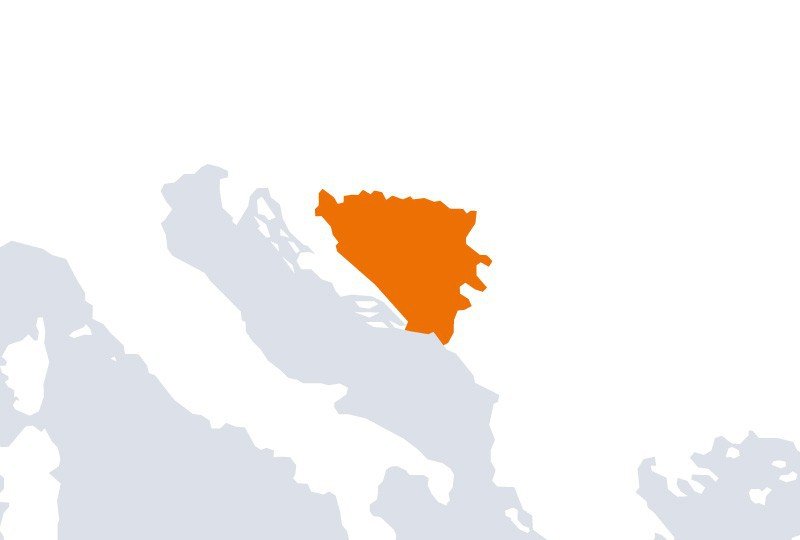The Bosnian Herzegovinian Committee aims to promote sustainable energy development in Bosnia and Herzegovina, as a part of the World Energy Council's energy vision. As a member of the World Energy Council network, the organization is committed to representing the Bosnian Herzegovinian perspective within national, regional and global energy debates. Members of the BH Committee include represented by ministries (state and entity level), energy institutions, universities, and companies of the Bosnian Herzegovinian energy sector and the Committee includes a variety of members to ensure that the diverse energy interests of Bosnia and Herzegovina are appropriately represented.
Its membership (individuals from governmental institutions, universities, scientific institutes, energy industries and consulting and other companies, as well as from professional associations in the energy field as the collective members) takes an active part in all energy related matters in the country.
.jpg)
Minister of Foreign Trade and Economic Relations of Bosnia and Herzegovina Staša Košarac was born on March 19th, 1975 in Sarajevo, where he completed elementary and high school. He graduated from the Faculty of Business and Industrial Management in Belgrade in 2014. He is a member of the Alliance of Independent Social Democrats (SNSD).
He was appointed Minister of Foreign Trade and Economic Relations of BiH on December 23rd, 2019. In the 2014 general elections, he won a direct parliamentary mandate in the House of Representatives of the BiH Parliamentary Assembly. In 2018, he again won a mandate in the House of Representatives of the BiH Parliamentary Assembly, in which he acted as Chairman of the Caucus of SNSD members in this legislative body, until his appointment as the Minister of Foreign Trade and Economic Relations of BiH after the Council of Minister of BiH was formed.
He performed his first public function as a Counsellor in Municipality Assembly of Višegrad when he was 25 years old. He won his mandate in the Republika Srpska National Assembly in 2004, and two years later became the Chairman of the Serbian Club Caucus in the Republika Srpska Council of Peoples.
From 2010 he performed the same function in the House of Peoples of the Parliamentary Assembly of Bosnia and Herzegovina. From 2013 to 2014 he was the Chairman of the House. He was elected Head of the Team for Coordination for War Crimes and Missing Persons of Republika Srpska as a decision of the Government of Republika Srpska in January 2010.
He is married and a father of three. He lives in Istočno Sarajevo.
Dr. Admir Softic, Secretary General of the Bosnian Herzegovinian WEC Member Committee, is an Assistant Minister for Sector of energy in the Ministry of Foreign Trade and Economic Relations of Central government of Bosnia and Herzegovina, in charge of sector of energy taking care of administrative settlement, normative and legal affairs, documentation and informational affairs in the field of energy, natural resources management and concessions. From February 2015 till July 2016 he served as Assistant Minister for sector for natural resources, energy and environment protection. He has more than 18 years of scientific and professional experience in the field of energy, energy policy, mining, power system modelling, simulation, analysis and planning. He has gained experience in solving complex energy problems, including energy strategies, studies and projects in energy efficiency, spatial planning, municipal energy, modelling and balancing energy-producing processes and promotion of renewables. He has intensive experience in knowledge management and networking in Bosnia and Herzegovina and the Western Balkans. He participated as a lead project manager or coordinator in several EU development projects. He is Assistant Professor at the Faculty of Mining, Geology and Civil Engineering, University of Tuzla. He is the author of 3 university textbooks, as well as of more than 30 papers.
He is the focal point for energy and environment in the Union for Mediterranean, Focal point in the IRENA and he is member of the Environmental Working group in the Energy Community Secretariat.
Energy in Bosnia and Herzegovina

The energy sector of Bosnia and Herzegovina (BiH) is in a demanding process of transformation from being a traditional, predominantly fossil fuels sector to a renewable energy sector. This, together with the implementation of energy efficiency measures, like involving customers in electricity generation, individually or through energy communities; digital monitoring; and management and optimisation systems, can be a powerful flywheel of the BiH economy. A stable policy and investor environment are essential for mobilising necessary energy transition investments. By signing the Sofia Declaration on the Green Agenda for the Western Balkans in November 2021, BiH further reaffirmed its strong commitment to align with the European Union's ambitious energy transition goals to achieve climate neutrality by 2050. However, the main challenge lies in establishing a comprehensive legal and institutional framework and a good investor environment for integrated energy and climate change management. Currently, related areas of the Energy Union are treated separately within the existing framework in Bosnia and Herzegovina. Establishing a legal framework for energy and climate, decarbonisation strategies at all levels and an appropriately effective institutional framework for implementation should be a priority in the coming period.
With the Council of Ministers adopting the Clean Energy Package and the Decarbonisation Roadmap in November 2021, the Energy Community confirms its readiness to join the European Union and other international partners in achieving net-zero greenhouse gas emissions by 2050. With this decision, Bosnia and Herzegovina has become obliged to transpose and implement EU requirements on integrated energy union management and climate action in the framework of the implementation of the Energy Community Treaty.
Despite the difficult working conditions caused by the COVID 19 pandemic, at the beginning of 2021, BiH intensified its activities related to the development of the National Energy and Climate Plan of Bosnia and Herzegovina (NECP). The plan should contain clear definitions of targets for renewable energy sources, reducing final energy consumption, primary energy supply, and greenhouse gas emissions from the energy sector. In addition, the plan should prescribe appropriate policies and measures to enable the achievement of established goals and targets. On the other hand, the desired scenario for developing the process of decarbonisation of the energy sector should be based on the macroeconomic criteria, and optionally include additional environmental and social criteria.
Integrated energy and climate management imply the implementation of policies and measures of interdependent elements of the energy sector, primarily related to the five fundamental dimensions of the Energy Union, namely: decarbonisation (reduction of greenhouse gas emissions and renewable energy sources), energy efficiency, security of supply, internal market energy, research, development and competitiveness.
Given such ambitions, increasing the share of renewable energies in the overall energy mix remains the top Action Priority in Bosnia and Herzegovina. Although official energy balance for 2020 is still not published, it is expected that BiH will achieve its 2020 target of 40% renewable energy source (RES) in total final energy consumption. Currently, within the NECP process, a new 2030. RES targets (both overall and sectoral) are under development. Market design and support mechanisms are needed for the implementation of this Action priority. Bosnia and Herzegovina focused on support scheme reform and transition towards market-based mechanisms and drafted a legal framework for a market-based support scheme, the adoption of which is expected in 2022. Transposition of provisions related to the sustainability of biofuels as well as the establishment of an electronic system for guarantees of origin is also a priority. In that aspect, BiH recently joined the Energy Community regional initiative to establish an electronic system for guarantees of origin.
In 2021 Bosnia and Herzegovina reported a significant increase in the share of renewable energy compared to previous years and reached its sectorial target for the share of renewable energy in heating and cooling. Additional efforts are needed to increase the use of renewable energy in the electricity and transport sectors (Energy Community 2021 Implementation Report).
Regional integration is the top critical uncertainty that could affect the energy transition. According to the Energy Community 2021 Implementation Report, Cross-border transmission capacity is allocated through the Coordinated Auction Office in South East Europe (SEE CAO) (with Croatia and Montenegro), or bilateral auctions (with Serbia). Cross-border cooperation agreements are in place for the exchange of balancing, ancillary services and security arrangements. Market coupling depends on the establishment of a day-ahead market.
Improving Energy Efficiency is also seen as a key priority for Bosnia and Herzegovina where much progress can and needs to be made. For BiH, buildings are responsible for 40% of total final energy consumption (Eurostat, BiH energy balance for 2019, 2021. edition). In that aspect, in the final draft of the Building Renovation Strategy of Bosnia and Herzegovina has been prepared (expected to be adopted during 2022), which considers three levels of renovation of buildings with defined annual renovation rates and average renovation depth. Renovation scenarios of buildings were also the subject of an economic impact analysis, the results of which were incorporated into the selection of the optimal scenario, which determines the main energy efficiency goals, during the development of the NECP.
BiH becomes one of the first countries in Western Balkans to adopt the updated Nationally Determined Contributions (NDCs) with the plan to cut greenhouse gas (GHG) emissions for 33.2% by 2030, and almost 66% by 2050, compared to 1990 levels.
Comparing to the initial NDC which was submitted in 2015, the revised NDC increases emission reduction goals by 50% till 2030, with the focus on key country sectors: power, district heating, buildings, industry, transport, forestry, agriculture, waste.
NDC covers the period from 2020 to 2030, with projections up to 2050 and provides a description of planned activities to reduce greenhouse gas emissions and mitigate climate change and includes a description of activities undertaken to adapt to the inevitable climate change. Adaptation to climate change in BiH is also one of the priorities. The NDC includes available data on losses and damages caused by climate change and provides a description of activities undertaken to adapt to climate change.
Acknowledgements
Bosnia and Herzegovina Member Committee
Sanja Kapetina
Downloads

Bosnia and Herzegovina Energy Issues Monitor 2022
Download PDF
World Energy Issues Monitor 2022
Download PDF





_368_520_s_c1_c_c.png)





